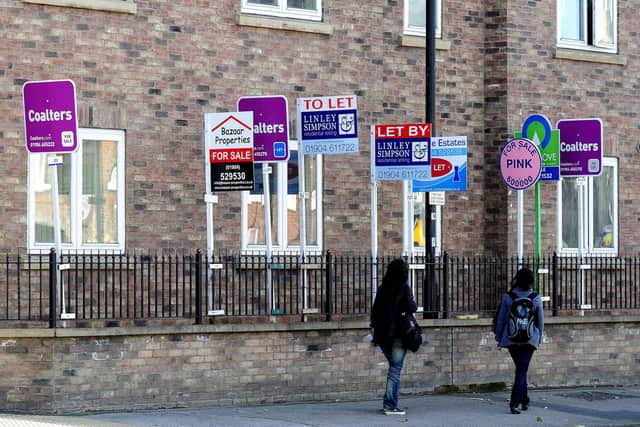Scotland ‘dishearteningly out of reach’ of being able to provide everyone with homes, damning new report says
Scotland is “dishearteningly out of reach” of being able to provide everyone in Scotland with a home that meets their human rights, a damning report has said.
The ‘Housing in Scotland’ report says those who are needing a home are being “failed” by the housing emergency, caused by “unsustainable pressures” and a “critical lack of capacity” in council and social housing.
Advertisement
Hide AdAdvertisement
Hide AdThe document reveals there are 243,603 people on a waiting list for social housing across Scotland, but the number of social houses being allocated each year is just 26,102.


A number of drastic measures are now being recommended to tackle the spiralling problem, including stopping the sponsorship scheme for Ukrainian refugees fleeing the war, and increasing how long people can be temporarily housed in a bed and breakfast.
The report has been compiled by Solace, a group that represents council chief executives and senior managers. It says there are “simply not enough” affordable homes available in Scotland, and councils are not able to reverse this worrying position.
The report states: “In the current context, put simply, Scotland is not in a position to provide a home to all citizens that need one and we are therefore dishearteningly out of reach of implementing the human right to adequate housing.”
This unsustainability is not just in social housing – the report states demand for private rented homes also “far outstrips availability” in most areas, with private landlords being “inundated” with offers for their properties.
This is being exacerbated by some recent changes to taxation and legislation such as rent caps, which have led to some landlords leaving their properties empty rather than letting them out. The report warns this is “bad news” as it will result in more people needing to turn to their local council for help.
Cleland Sneddon, chair of Solace Scotland, said: “The social sector needs to grow by at least 125,000 homes just to meet current demand. However, since 2022 just 18,583 affordable homes have been delivered and the supply of affordable housing has fallen 20 per cent in three years.
“Our conclusion is that it is clear that a fundamental review of homelessness services and social housing provision in Scotland is required.”
Advertisement
Hide AdAdvertisement
Hide AdHomelessness is at an “all-time high” in Scotland because of the coronavirus pandemic and the cost-of-living crisis, particularly in urban areas such as Edinburgh and Glasgow.
One of the proposals the report suggests is temporarily pausing proposals to change the definition of “threatened with homelessness”.
This applies to people who could potentially become homeless within the next two months, but there are plans to increase this to six months.
Often those who are in immediate need of accommodation are sent by councils to a local bed and breakfast (B&B).
Several local authorities which had previously not had to rely on B&Bs are now having to do so. In Orkney, for example, this has increased by 150 per cent since the start of the pandemic.
The report suggests: “Local government would welcome a temporary revision to the unsuitable accommodation order to allow the use of B&B accommodation for longer than seven days – similar to the revision made during the pandemic. This would reflect the crisis situation we are currently in.”
Although the report says homelessness is more of an issue in urban areas, it notes there are unique challenges in rural and island areas because of a shortage of affordable housing.
Some of the biggest problems here are higher building costs and people who don’t live in the area buying up second homes or holiday lets. In rural and island areas, the average cost of building a new home is in excess of £300,000, whereas the national average is just £200,000.
Advertisement
Hide AdAdvertisement
Hide AdOne of the biggest pressures facing council and social housing providers is the need to provide accommodation for refugees and asylum seekers from places such as Ukraine and Afghanistan.
There is likely to be an increase in the number of people being granted asylum in coming months because of a new decision-making process by the UK Home Office. The report warns this will likely have a “significant impact” on councils in a short space of time.
This may become more exacerbated as Afghans who are staying in hotels have been told they must leave them by August.
There are also more than 24,500 displaced people now living in Scotland through the Ukrainian refugee sponsorship schemes, which is a scale “never seen in Scotland before”.
Many of these refugees are staying in people’s homes, but some have been housed in other ways, such as on cruise ships. Solace’s report says housing refugees in this way could be breaching housing standards.
This comes as the Scottish Government announced all refugees who had been staying on the MS Victoria in Edinburgh have now left and been supported to find housing elsewhere.
However, the influx of refugees coming into Scotland is having a knock-on effect on the challenges facing the housing industry. The report adds: “The super sponsor scheme should not reopen until such a time that central government is in a position to offer welcome accommodation.”
The Government has previously said there are no plans to restart this programme.
Advertisement
Hide AdAdvertisement
Hide AdA Scottish Government spokeswoman says they are now considering the recommendations made in the report, but adds its long-term strategy ‘Housing to 2040’ sets out a route map for how to deliver social housing in Scotland.
The spokeswoman added: “Despite global issues such as rising costs of construction supplies and workforce issues, the number of affordable homes completed in Scotland in the year to end March 2023 is the highest annual figure since 2000.”
Comments
Want to join the conversation? Please or to comment on this article.